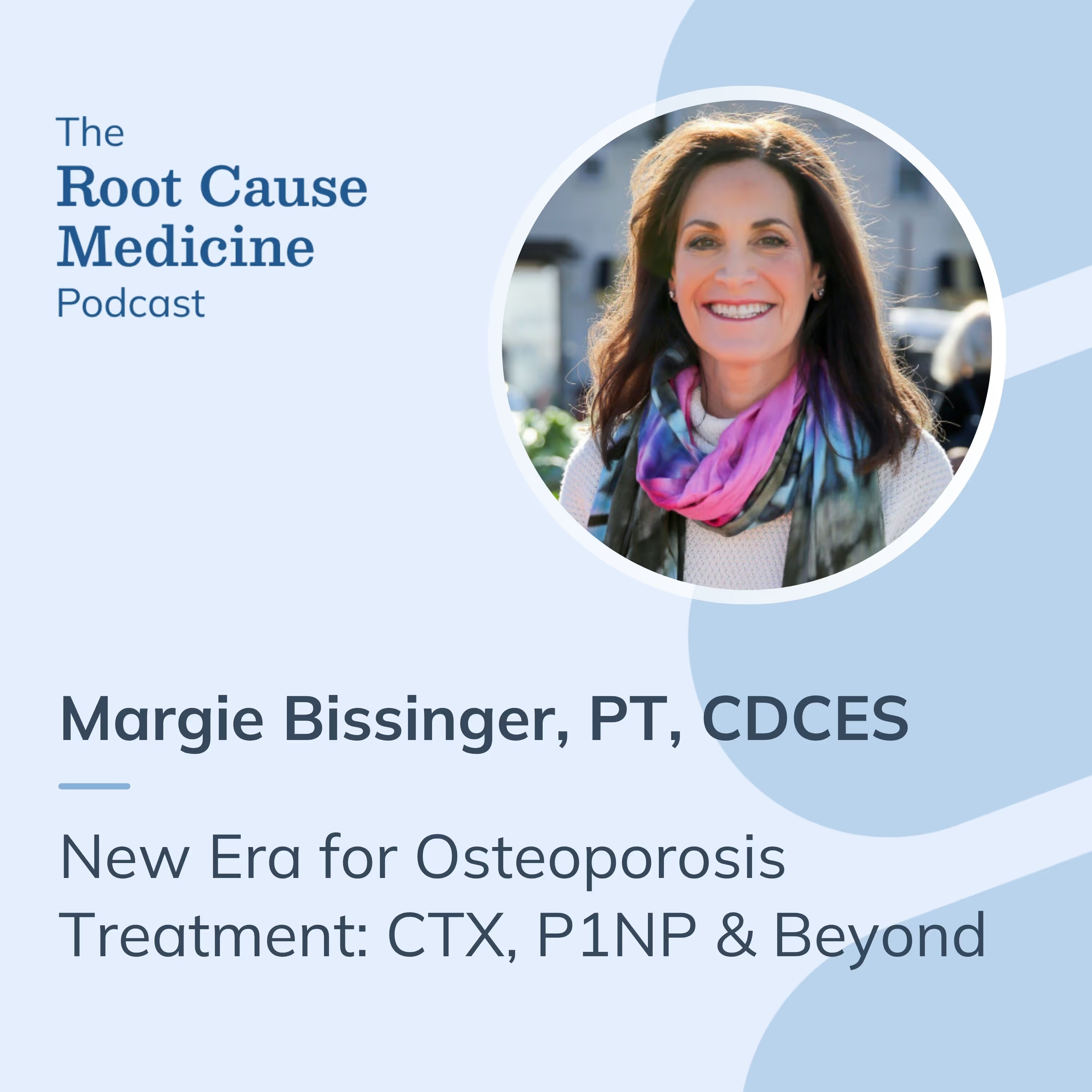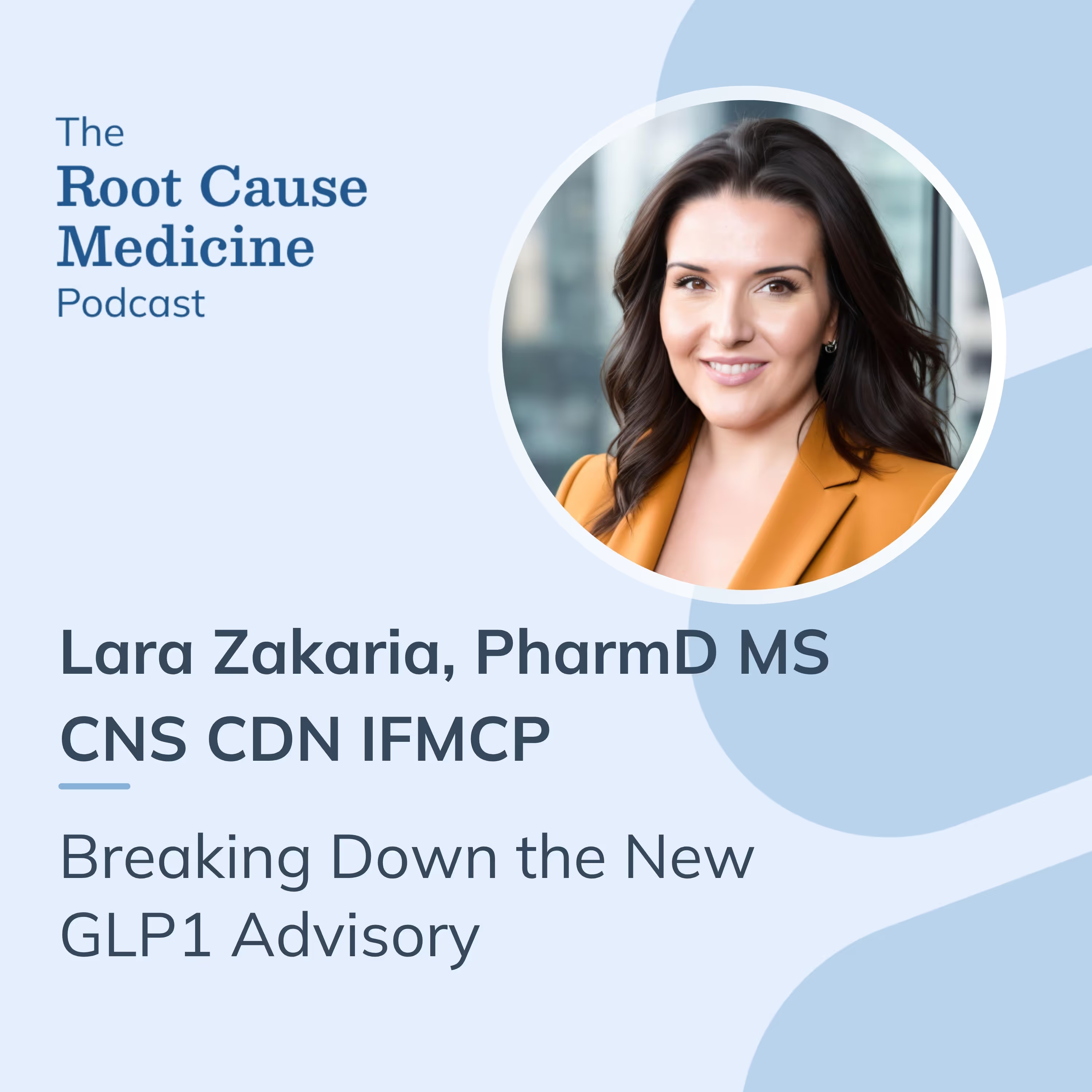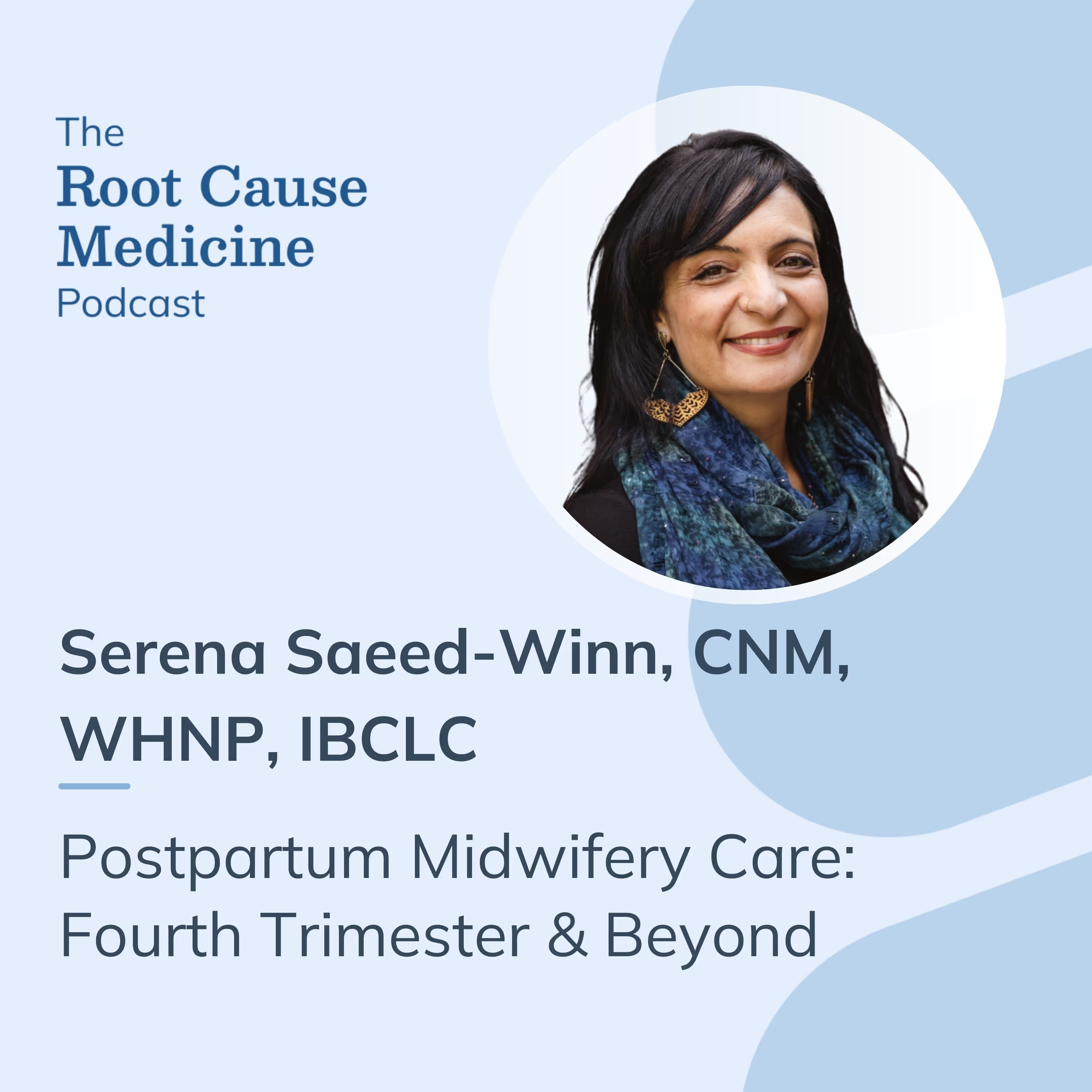Hashimoto’s thyroiditis is an autoimmune condition of the thyroid gland that affects 5% of Americans. When this autoimmune process occurs, inflammation may happen and can affect the thyroid’s ability to create the thyroid hormones of T4 and T3. The lowered production of thyroid hormones is what we refer to as an underactive thyroid or hypothyroidism. In fact, Hashimoto’s thyroiditis is a common cause of hypothyroidism in the developed world. Thyroid hormones are used by every single cell in the body, meaning that changes in its hormone levels can be associated with a wide array of symptoms, including fatigue, weight gain, menstrual irregularities, hair loss, and mood changes.
Conventional treatment of Hashimoto’s thyroiditis is similar to hypothyroidism, with treatments often involving some form of thyroid hormone replacement. While this is a common intervention, there are also traditional, complementary, and integrative medicine (TCIM) options that focus on supporting the body's natural processes. Thus, an integrative approach for hypothyroidism may differ from that of hypothyroidism due to Hashimoto’s thyroiditis. This article will focus on the TCIM options available for individuals with Hashimoto’s thyroiditis.
[signup]
Functional Medicine Labs That Can Help Individualize Support for Individuals With Hashimoto’s Thyroiditis
Functional medicine offers many labs that can help to individualize the support of Hashimoto’s thyroiditis, including the following:
Thyroid Panel
A thyroid panel for Hashimoto's thyroiditis may include the thyroid hormones T4 and T3, thyroid stimulating hormone (TSH)- the hormone produced in the pituitary gland which tells the thyroid to make thyroid hormones- as well as thyroid antibodies: anti-thyroid peroxidase (TPO) and anti-thyroglobulin (Tg). In Hashimoto’s thyroiditis, one or both of these antibody levels may be elevated, indicating the autoimmune process is occurring. If support has not yet begun, TSH may be elevated, and T4 and/or T3 may be low. Boston Heart Diagnostics Thyroid Panel includes all of these markers and is an option for those with Hashimoto’s thyroiditis.
Micronutrient Panel
Micronutrients are vitamins and minerals required by the body in small amounts. Various micronutrients play an essential role in thyroid physiology, including iodine, selenium, magnesium, vitamins B2, B3, B6, iron, tyrosine, and vitamins A, C, D, and E. Many of these vitamins and minerals aid in the formation of thyroid hormones. Others help with thyroid hormone uptake by tissues in the body.
Comprehensive Stool Panel
A comprehensive stool panel assesses markers of gastrointestinal functioning, including markers of digestion, absorption, immune function, and inflammation. Additionally, these tests evaluate the microbiome: a collective group of organisms, including bacteria, viruses, fungi, and parasites, that live within our large intestine. The microbiome affects our digestion, absorption, immune and inflammatory functions, hormone metabolism, and more. When the microbiome is imbalanced with pathogenic or bad organisms, we refer to this as dysbiosis. Dysbiosis has been associated with autoimmunity. For Hashimoto’s thyroiditis, the following organisms have been associated with its development: Helicobacter pylori, Yersinia enterocolitica, Candida albicans, and Epstein-Barr virus (EBV). All of these organisms can be tested for on a stool test such as GI Map by Diagnostic Solutions.
Additionally, dysbiosis, as well as other factors, including poor diet, stress, and environmental factors, can lead to increased intestinal permeability, also known as “leaky gut.” When a leaky gut occurs, particles that are being digested move into the bloodstream before they are properly broken down. When this happens, our immune cells see these particles and treat them as foreign invaders by attacking them. Thus, an autoimmune process may occur that will continue until the permeability, or “leakiness,” is addressed. One way to measure this is through a protein called zonulin, which can be checked in the stool and added to the GI Map test.
Stress Testing
Stress testing involves assessing levels of cortisol, the body’s primary stress hormone. Stress may play a role in the development of Hashimoto’s thyroiditis, as stress can increase the inflammatory cascade and has also been associated with changes in circulating thyroid hormones. The Diurnal Cortisol Test by ZRT Laboratories is a way to assess levels of cortisol throughout the day. If stress is affecting the person, these cortisol levels may be out of range.
Conventional Treatment for Hashimoto Thyroiditis
Conventional treatment for Hashimoto’s thyroiditis often involves thyroid hormone replacement medications. This treatment is important, as untreated hypothyroidism can lead to serious health issues. Options for thyroid hormone replacement can include synthetic T4, synthetic T3, natural forms of both, or a mixture of T4 and T3. Conventional standard of care often recommends synthetic T4 medication only. However, many individuals with Hashimoto's thyroiditis still report symptoms even with this treatment. A study done in the Journal of Translational Autoimmunity reviewed 30 different studies on Hashimoto’s thyroiditis patients to evaluate if symptoms persist despite conventional treatment. They found the majority of the studies saw a positive correlation between autoimmunity and a lower quality of life and/or persistent symptoms despite conventional treatment.
Complementary and Integrative Medicine for Hashimoto Thyroiditis
Complementary and integrative medicine options for Hashimoto’s thyroiditis should be evidence-based and can include dietary modifications, supplements and herbs, mind-body techniques, and acupuncture.
Dietary Modifications for Individuals With Hashimoto’s Thyroiditis
Since many micronutrients, as discussed above, are involved in thyroid physiology, dietary recommendations for those with Hashimoto’s thyroiditis may include a diet full of whole foods rich in vitamins and minerals. An example of this type of diet would be the Mediterranean diet. The Mediterranean diet emphasizes the consumption of local and organic fruit, veggies, herbs, spices, nuts, seeds, olive oil, fatty fish, and minimally processed whole grains. This wide array of foods ensures adequate amounts of micronutrients are included in the diet. However, one modification can be made to this diet specific to Hashimoto’s thyroiditis- the elimination of gluten. Gluten is a protein that is found in many grains, including wheat, barley, oats, and rye. The molecular structure of gluten is similar to the molecular structure of enzymes found within the thyroid gland. If a leaky gut is present and gluten is entering the bloodstream, antibodies may begin to form against gluten. When this happens, antibodies can get confused and mistake the enzyme in the thyroid gland for gluten since they are similar. This, in turn, may trigger an autoimmune response involving the thyroid gland.
Supplements and Herbs
Supplements and herbs that may benefit those with Hashimoto’s thyroiditis include selenium, vitamin D, Cordyceps sinensis, and probiotics.
Selenium
Selenium is a mineral necessary for various systems of the body, including the immune system, reproductive system, and for thyroid physiology. Several studies have shown the importance of selenium supplementation in those with Hashimoto’s thyroiditis, as selenium may help support the immune system and overall thyroid health.
Dose: 200 mg per day
Duration: 4-6 months
Vitamin D
Vitamin D is a fat-soluble vitamin primarily retained through UV sun rays. Vitamin D is important for bone mineralization but can also affect other processes in the body, including thyroid physiology. Low vitamin D levels have been associated with the development of Hashimoto’s thyroiditis. Supplementing with vitamin D may help support thyroid health.
Dose: 2,000 iu/day or dose should be dependent upon the testing level.
Duration: Minimum of 6 months, or duration should be determined by following laboratory findings.
Cordyceps sinensis
Cordyceps sinensis has been used for thousands of years in traditional Chinese medicine. It is a mushroom that can be used for many different purposes, including supporting energy, endurance, and sleep; interestingly, all symptoms can be impacted by the thyroid. Research suggests Cordyceps Sinensis may be beneficial for those with Hashimoto’s thyroiditis, as it may support overall thyroid health.
Dose: 6 grams per day
Duration: Minimum of 24 weeks
Probiotics
Probiotics are supplements that contain beneficial organisms that aid in the health of the microbiome. Probiotics help to support a healthy microbiome by promoting diversity. Probiotics may be beneficial for those with Hashimoto's thyroiditis since the gut microbiome plays a role in overall health.
Dose: The dose and type of probiotics can be determined with the help of comprehensive stool testing.
Duration: Duration of use should also be determined by improvement in comprehensive stool testing markers.
Mind-Body Techniques for Individuals With Hashimoto’s Thyroiditis
Mind-body techniques can play a role in reducing stress levels and supporting overall well-being, both of which are part of the disease process in Hashimoto’s thyroiditis. A study was done on mind-body techniques in the support of women with Hashimoto's thyroiditis. Sixty women were split into two groups; one group received mind-body therapies, and the other group was a control. The group receiving mind-body therapies was instructed to do a different therapy every week, which included: lifestyle and routine changes, diaphragmatic breathing (breathing exercises using your diaphragm muscle), progressive relaxation techniques, cognitive reconstruction, dietary changes, guided imagery, and conversations. After eight weeks, the intervention group had significant reductions in thyroglobulin antibodies and improvements in TSH and thyroid hormones. They also reported reductions in stress, depression, and anxiety.
Acupuncture and Traditional Chinese Medicine for Individuals With Hashimoto’s Thyroiditis
Acupuncture is a Chinese medicine modality that has been used for thousands of years. Acupuncture is the insertion of tiny needles with the idea that the needles are stimulating the body’s “qi” or vital life force. Acupuncture is used for many conditions, including migraines, low back pain, infertility, menstrual pain, and more. Research suggests that acupuncture may be beneficial for thyroid disorders by supporting overall health and well-being.
Integrating Complementary Approaches with Conventional Support
Since medication is often required for the support of Hashimoto’s thyroiditis, but many individuals still present with symptoms, it’s important for healthcare practitioners to collaborate when supporting individuals. Additionally, many interactions between medications and supplements do occur; therefore, it's essential that all practitioners involved in the care of the individual are aware of what the individual is taking and what the other practitioner is recommending. As the individual improves, laboratory values may change, and thus, prescriptions and/or supplement doses may need to be altered or perhaps removed, yet again pointing to the importance of communication between practitioners.
[signup]
Summary
Hashimoto’s thyroiditis affects many Americans and is a common cause of hypothyroidism. As the thyroid gland and the hormones it produces affect every system in the body, an under-functioning thyroid can result in many symptoms and significantly impact the person’s quality of life. Functional medicine testing can help to evaluate the root cause of the autoimmune process and, thus, can help support overall well-being. Once testing is completed, options can include dietary changes and the addition of supplements, herbs, mind-body techniques, and acupuncture.












%201.svg)







